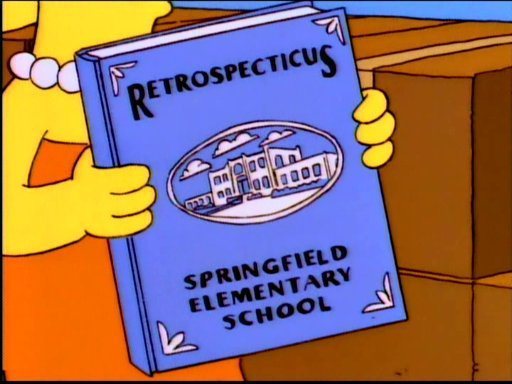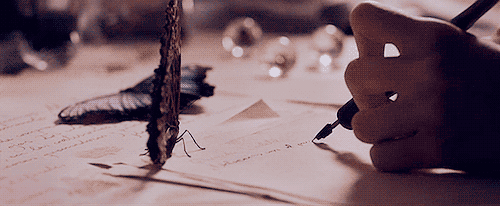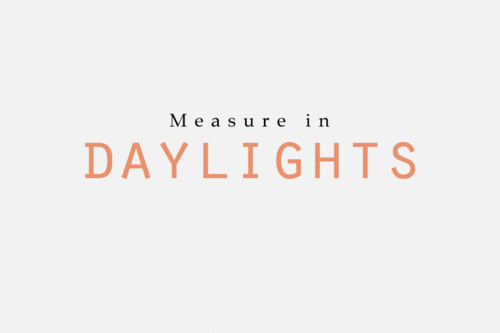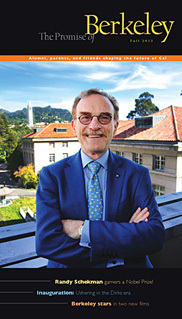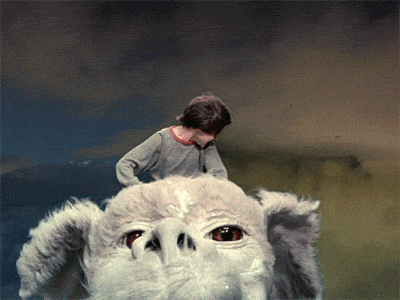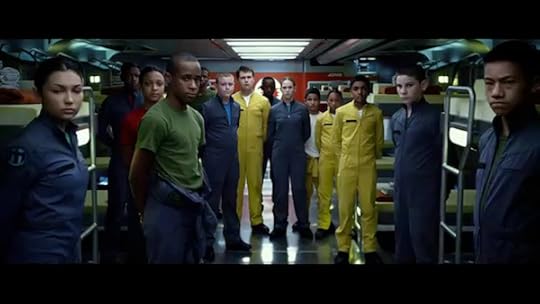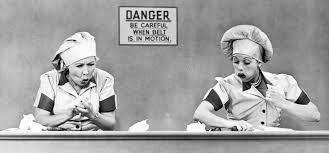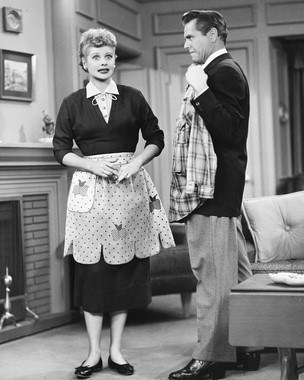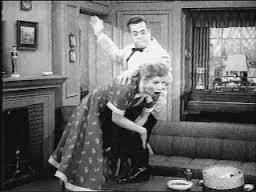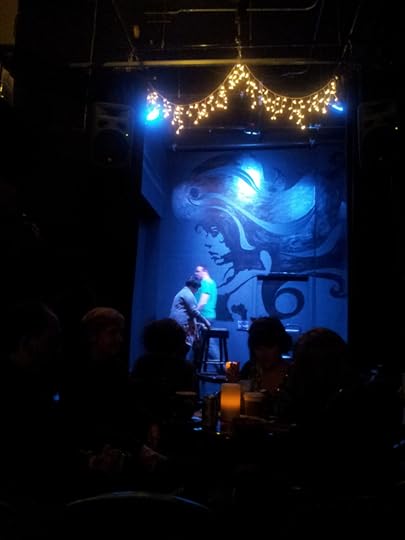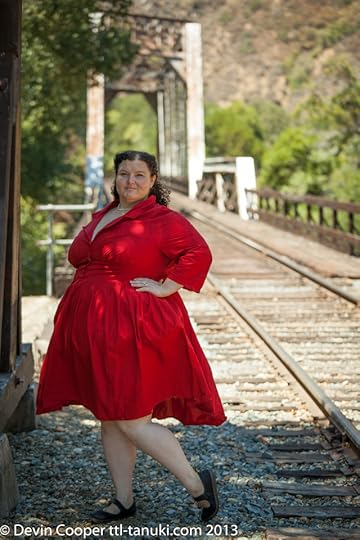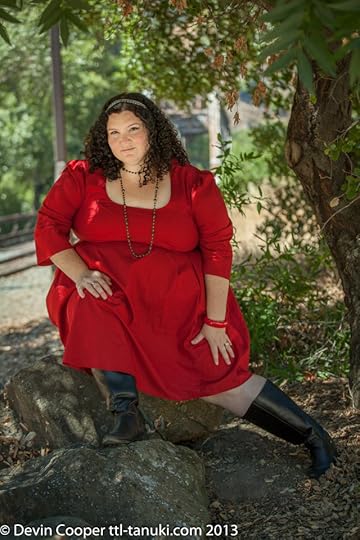Meg Elison's Blog, page 4
December 25, 2013
2013 Retrospecticus
I started this off planning to only look back over the fall semester. One of the great things about being in school is that it cuts the year into manageable sections with long periods of time off. I’m off for a month over the winter and I can’t say how much I’ve needed it. This was a great semester and a deeply-lived year. I’ve been productive and very happy and more fully MYSELF than I’ve ever been before. It’s a different kind of tired by far than the beat-down bone-weary I used to feel working retail, living in Hemet, and treading water.
So, at the beginning of this year we were in Fremont. Our old house was called the Bridge. The name stuck at first because we had joked that it was so expensive to rent up here that we’d end up living under an actual bridge. It sticks now because it was our bridge, from where we were to where we are. We still live with the world’s best roommates, because seriously why would we give this up?
I was writing at Caliber Magazine at the beginning of the year, and although I no longer write there I still work for the publication. I was working for the Institute of Human Development, a job that I enjoyed thoroughly in transcription. Pretty sure my typing got faster and more accurate because of it. In the summer, and I applied for and got a column with the Daily Cal. I LOVE working for the DC, and it’s opened doors for me I never dreamed existed. I could happily do this job forever, and I hope to do some version of it for a living.
Over the summer, I did the Summer Creative Writing Workshop at Cal. I met some great people and talented writers, and learned more in six weeks about what I really want to do than I’ve gotten in the rest of my life combined. It was a transformative summer.
Spring semester was my first go at a rack of only English classes, and I liked it so much I did it again this fall. My grades are good. Thank you to everyone out there whose tax money pays for me to go to school. I appreciate it so much and I never forget what it’s worth.
This is not in order, because everything overlapped this year. #sorrynotsorry
I wrote a novel. Mostly over the summer, but it’s been refined through fall and winter through the tireless efforts of my husband and friends who have kindly read for me and with me. I may be able to get this thing into print.
So since it’s the time of year to get maudlin (read:drunk) and sing my way through RENT, the question is: how do you measure a year? In daylights? In sunsets? In midnights? In cups of coffee?
No. I’m measuring this year in pieces in print. Because I know who I am and what I was meant to do.
In books: “Anaïs” 2013 (poetry)
Published in “From the Four-Chambered Heart: In Tribute to Anaïs Nin”
Sybaritic Press, Los Angeles
http://www.amazon.com/From-Four-Chambered-Heart-tribute/dp/1467581364
For Caliber: 19 stories http://calibermag.org/articles/author/megelison/
For The Daily Californian: 60 stories http://www.dailycal.org/author/melison/
For Promise of Berkeley: 1 piece, although technically this is an edited reprint of a piece I wrote for the DC, I was honored that they wanted to use it. http://issuu.com/shawnm/docs/2013_fall_promise/35?e=1339261/5976424
I submitted a ton of things for publication this year. Some said yes, some said no. I hope to have this good a number in 2014, and that my novel gets picked up. If so, 2014 will win in wordcount alone. I’ll also be interning at the SF Chronicle next year, so who knows what will happen?
In 2014, I’m going to graduate from college. I won’t dwell on what that all means just yet… but it’s coming.
My life has gotten exponentially better every year. There’s a lot of pressure on you, 2014. Let’s do this.


November 5, 2013
Ender’s Game: the Good, the Bad, and the Boycott
 When I was about 13, I read Ender’s Game by Orson Scott Card. I was reading Asimov and Bradbury and I really loved sci-fi adventures. Unlike a lot of other things on my list, this was a book my friends had read and we could share. I was in the G.A.T.E program at my junior high school, so we all identified with these high-pressure smart kids who couldn’t be blamed for their own catastrophes. Our love was simple; we didn’t think about the implications of the novel and OSC didn’t yet have a blog. It was a long time ago.
When I was about 13, I read Ender’s Game by Orson Scott Card. I was reading Asimov and Bradbury and I really loved sci-fi adventures. Unlike a lot of other things on my list, this was a book my friends had read and we could share. I was in the G.A.T.E program at my junior high school, so we all identified with these high-pressure smart kids who couldn’t be blamed for their own catastrophes. Our love was simple; we didn’t think about the implications of the novel and OSC didn’t yet have a blog. It was a long time ago.
Of course, it’s a movie now. Ender himself is a fetching little Napoleon ordered around by a dour metaphor wearing Harrison Ford’s face and the two of them waltz like every double-damned father and son ever given a special effects budget. The effects are dizzying, but fall short of excellent. The story never was any good, unless you were a kid who believed you could have been Ender.
The Good: The film has beautiful moments. It delivers a few facts skillfully and subtly. The two child policy on Earth is not belabored; the expense and unwelcome vibe toward Ender as a “third” comes across neatly without being over-explained. However, most of Ender’s revelations come out of a magical nowhere. He visits that otherspace and chills with Jesus and Neo and Harry Potter and comes back just knowing things he has no reason to know. Of course he does. He’s our Magical Boy.
The cast is surprisingly diverse. The International Fleet looks pretty international for a film made in the States. Viola Davis does a stunner of a job, and Ender’s own team is made up of kids from all over. Of course, the leadership roles are fulfilled by white men and white boys and “half-Maori” tattooed guys in blueface. Still, it’s nice to see a cast of nonwhite actors with speaking roles.
The Bad: Forget being surprised. The plot screams at you from miles away. I’M COMING AND I’M GOING TO BE SUPER OBVIOUS TRY TO ACT SURPRISED. Then it barrels down on you and is oblivious to your boredom. The film cannot make us care about anyone. Ender is smart and resourceful, but also insufferable and eye-rollingly competent at everything without even a musical training montage. His friends are fleeting presences of sweetness and his enemies are one-dimensional mustache-twiddling Malfoys. The adults are always slightly sinister and might as well be wearing sandwich boards marking them as THE MILITARY INDUSTRIAL COMPLEX and THE EXPERIENCE OF WAR. It’s not a subtle film. It does not make up for a lack of subtlety with jaw-dropping beauty or heart-pounding action. The space-battle sequences all pretty much boil down to tessellated patterns of identical things swarming through space. Like ID4 with a different color scheme. Bravo.
The Boycott: I cannot delicately state how I feel about Orson Scott Card. He is one of the most virulently ignorant and bombastically bigoted writers living today. He offends me deeply and he goes out of his way to offend most of his former fans. I’ll celebrate his death. I bought his books before I knew better. The way things are now, I’d rather eat a live snake than give him a dime. Opening weekend, I bought a ticket to another IMAX movie and snuck into Ender’s. I know there is a rumor that OSC will not profit from the film’s box-office take, but he’s listed as a producer and I don’t buy it. I hope he finds himself starving and panhandling in the gayest neighborhood in America so that he must live on the generous yet humbling charity of the people he’s attacked throughout his career. I’m doing my part to manifest that outcome by not paying to see this film.
Overall: This was not great. This was not mind-blowing in IMAX. It’s not a great story after you’ve grown up and seen that the man behind the curtain is a one-trick pony and a reprehensible toad. It wasn’t worth the subterfuge or the money. Get it from Redbox or other perhaps less legal means if you’re still curious a few months from now. Otherwise, save your money and wait for Catching Fire.


October 28, 2013
Teachers
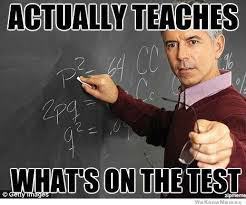 The other day in my Chernin class, we were asked to talk about our favorite teachers. At the time, I mostly named professors I’ve had at Cal because the people in my group are all looking for tips on who they should take (and not take) in the semesters to come. I’ve had spectacular teachers at Berkeley, without a doubt. I’ve sat in lectures with people who blew me away with what they have studied and written and created. Profs. Breitweiser, Sorenson, Thornbury, Murphy, Loewinsohn, Goble, Knapp, and Nelson have all been incredible. Insightful people, with engaging lecture and approachable ways in one-on-one interaction.
The other day in my Chernin class, we were asked to talk about our favorite teachers. At the time, I mostly named professors I’ve had at Cal because the people in my group are all looking for tips on who they should take (and not take) in the semesters to come. I’ve had spectacular teachers at Berkeley, without a doubt. I’ve sat in lectures with people who blew me away with what they have studied and written and created. Profs. Breitweiser, Sorenson, Thornbury, Murphy, Loewinsohn, Goble, Knapp, and Nelson have all been incredible. Insightful people, with engaging lecture and approachable ways in one-on-one interaction.
But I wanted to tell stories about teachers I had in the long-long-ago of high school, and the community college that helped me structure a useful brain and a viable academic record after dropping out. It’s hard to tell someone who wasn’t there how much it was all worth. But they were the lights along the way.
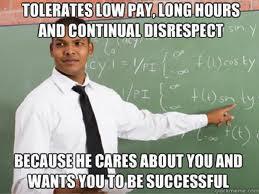 I went to high school in a soulless little town that I couldn’t wait to escape. I was the standard issue lost girl: no parents, no home, gaping attendance record, antagonistic to even the best of teachers. These were skilled and kind people for whom I would not perform. I let a few get to know me, but I was not in a good place. I remember Dick Powell, Suzanne Mastroianni, and Rich Herold as fantastic allies and encouraging influences even as I spiraled out of control. I remember trading barbs with Prof. Brigham who treated me like an equal even while I flunked chemistry. Twice. They deserved better students than I could be and I knew it. Still, every shipwreck offers salvage. I got some good things there, and I’m grateful.
I went to high school in a soulless little town that I couldn’t wait to escape. I was the standard issue lost girl: no parents, no home, gaping attendance record, antagonistic to even the best of teachers. These were skilled and kind people for whom I would not perform. I let a few get to know me, but I was not in a good place. I remember Dick Powell, Suzanne Mastroianni, and Rich Herold as fantastic allies and encouraging influences even as I spiraled out of control. I remember trading barbs with Prof. Brigham who treated me like an equal even while I flunked chemistry. Twice. They deserved better students than I could be and I knew it. Still, every shipwreck offers salvage. I got some good things there, and I’m grateful.
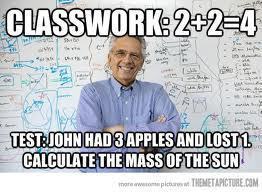 In community college, I had to re-learn how to go to school. I had spent five years working and figuring out how to be an adult. I had spent those same five years forgetting what being smart actually means; how it’s a thing that you do and not a thing that you are. Coming back is hard. I had help. I had Dr. Barth lecturing on the history of science and showing me Saturn through a telescope. Even I couldn’t be jaded to that. I had Larry Barkley pounding my essays under a logic that hits like a ball peen hammer until I knew how to do it right the first time. I had Christina Yamanaka expanding my horizons and making me read material I’d never even heard of before- and I try to anticipate in every class so that I always have something to say.
In community college, I had to re-learn how to go to school. I had spent five years working and figuring out how to be an adult. I had spent those same five years forgetting what being smart actually means; how it’s a thing that you do and not a thing that you are. Coming back is hard. I had help. I had Dr. Barth lecturing on the history of science and showing me Saturn through a telescope. Even I couldn’t be jaded to that. I had Larry Barkley pounding my essays under a logic that hits like a ball peen hammer until I knew how to do it right the first time. I had Christina Yamanaka expanding my horizons and making me read material I’d never even heard of before- and I try to anticipate in every class so that I always have something to say.
I had Theresa Hert explain to me for the first and only time in my life why learning algebra actually makes sense. She followed that up with another first: SHE TAUGHT ME ALGEBRA. Math was the thing that kept me up at night. Math was the reason I drank during finals and pulled my hair out during admissions. Hert’s Math 096 was one of the most deeply satisfying classes I have ever celebrated a B in. She made it matter, and then she made it make sense. Whatever MSJC is paying her, it’s not enough.
I have thank you letters to write; this is only an outline. I couldn’t answer the question to my own satisfaction in Chernin. The list of names and reasons is too long, and most of it took place too long ago and far away to be of any great utility to my classmates. For me, however, it’s then and now and always. It’s with me every step of the way. It’s a set of well-worn tools I was given when I began this that I still use every day.
I am so grateful to have been taught. Thank you all.


September 29, 2013
I Love Lucy: The New Series
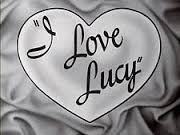
I grew up on I Love Lucy. It was one of my favorite TV shows, and it still is. I watched it innocently, without understanding what it represented in American history or our collective consciousness. I read late what it meant for Ricky and Lucy to sleep in separate beds and how daring it was for them to write her pregnancy into the show. I took it all on faith, at face value, and loved it for what it was. I thought their relationship was fine and even romantic. Oh little unenlightened Meg, with no parents to help me analyze or interpret what I consumed.
So lately I’ve been thinking we could reboot this series for modern television. Almost nothing has to change. The events are the same: Ricky and Lucy Ricardo are a married or cohabitating couple living in a Brooklyn brownstone. He’s a member of the creative class, and fairly successful. She’s a dreamer and works now and again when economic pressure builds up, or she just feels like getting a job.
She envies Ricky’s creative outlet and tries often to get him to include her. However, instead of wacky hijinks to get into the show, Ricky tells her coldly she’s too fat to be on stage. She’s too old to get into the movies. He undermines her self-esteem, so she derives most of her emotional support from her friend and neighbor, Ethel. The two of them smoke weed together, drink together, and generally enjoy funemployment like anyone would.
Darker times are ahead. Lucy falls into odd hobbies and fails at all of them. She joins a cult, trying to find herself. 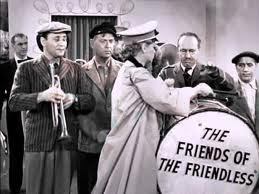
Lucy begins to suspect that the nature of her relationship with Ricky is abusive.
The two of them grow apart. They have a child, but it doesn’t fix anything. Ricky’s career is better than ever, but his insecurity also skyrockets. He escalates his abuse until there’s no denying it.
We watch them fall apart. There are a terse couple of years, they fight over money. Lucy develops a secret life, Walter White style. She’s internalized his body shaming for years and has a hard time feeling attractive, so she gives up on performing. She goes back to school and gets an internship with a startup. Despite success and a new outlook, she’s still attached to her marriage. She suspects Ricky has been cheating on her, and he is. She follows him just like in the original series but instead of hilarious misdirection, she finds them fucking. Wounded and confused, she sleeps with her best friend and finds it surprisingly satisfying.
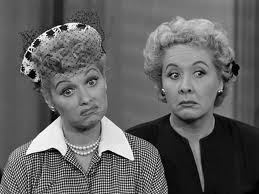 She and Ethel run away together. Ricky drinks too much and his smoking ruins his singing voice. The two women raise Little Ricky in Southern California, a place Lucy fell in love with when they all went there together to discuss a film option. They settle in Palm Springs and adopt a baby girl from China so that Lucy’s son can have a sister. Ricky calls sometimes, crying. Lucy is kind to him, but her triumph is all over her face as she hangs up. I love you, Lucy, she says to herself. At last.
She and Ethel run away together. Ricky drinks too much and his smoking ruins his singing voice. The two women raise Little Ricky in Southern California, a place Lucy fell in love with when they all went there together to discuss a film option. They settle in Palm Springs and adopt a baby girl from China so that Lucy’s son can have a sister. Ricky calls sometimes, crying. Lucy is kind to him, but her triumph is all over her face as she hangs up. I love you, Lucy, she says to herself. At last.
Call me, CBS. I’ll write you a pilot.


September 2, 2013
What I learned from my first transcription job
I took a work-study job at Berkeley last year transcribing for a project in the Institute of Human development. I received recordings of classroom interaction with kids in the 10-12 range and transcribed everything into a readable format for a couple of PhDs and wanna be PhDs.
It wasn’t a difficult job. It was usually interesting and different every time, and I liked that. It paid better than I’ve ever been paid before, and the expectations were kind and reasonable, and I liked that, too. I found that transcription is something that I’m quite good at and could do again in the future, if I wished. All good things.
The best thing about this job, however, has been what I’ve learned about the way people talk. I suppose I can’t say all people; this is rigidly controlled and scheduled interaction between teachers and students in Oakland talking about a limited number of subjects. However, I noticed a few things about these interactions that made me notice the same things happening in nearly everyone’s speech.
Here’s what I spotted:
1. Many times, when someone starts a sentence they have no plan on where they’re going and no idea how it’s going to end.
2. Similarly, people stop mid-sentence to interrupt themselves with parenthetical utterances that often have nothing to do with the eventual aim of the speaker. I’ll give you an example.
“Today we’re going to (and you guys have never done this before) try a game based on a debating technique (and I know we’ve had debates, but this kind is different) that involves two teams on either side of the room facing each other (well, not facing each other, more like a sort of a V shape against this wall) and then taking turns.
Granted, a lot of this can be chalked up to the way teachers struggle to convey complex steps and instructions to a room full of half-listening hellions. But I’ve seen people do it constantly since my appointment started. See if this sounds familiar:
“Well, I went to the post office on Tuesday (or maybe it was Wednesday? No, it was Tuesday because I had just been to yoga.) to mail some packages to my sister. (Not the sister in Alaska, the one in L.A.) So I walked in the door and I saw the post machine…”
We interrupt ourselves with details and qualifications and exceptions and corrections that aren’t relevant to the tale we tell, that make us seem scatter-brained and unsure, that keep us from getting to the point.
If we took a few seconds to think, to plan what we’re going to say, to say it as cleanly as possible, how different would that be?


July 31, 2013
Gushing Review: The Passage by Justin Cronin
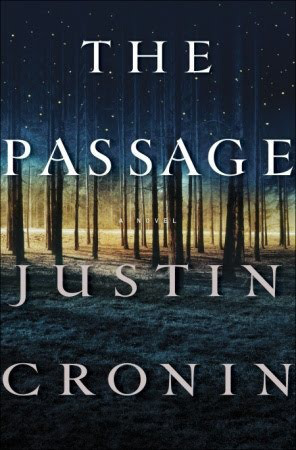 The Passage by Justin Cronin. This is one of the best books I’ve read in a long time. A truly epic tale, on par with “The Stand,” and it’s hard for me to say that. I avoid a great deal of modern fiction because the swath of mediocrity is wide and terrible. This is an incredible book.
The Passage by Justin Cronin. This is one of the best books I’ve read in a long time. A truly epic tale, on par with “The Stand,” and it’s hard for me to say that. I avoid a great deal of modern fiction because the swath of mediocrity is wide and terrible. This is an incredible book.
It’s got all the action we expect from genre fic. There are brilliant scenes of action, with heroes battling monsters and cities roiling with unrest. The narrative devices of newspapers and diary entries are utterly perfect- my heart quickened every time I saw one approaching. The pacing and descriptions build a detailed and heartbreaking world, and there is no part of this that is not richly imagined.
It’s also got literary weight to swing. The prose is dense and deep, evocative and textured, real and visceral. The dead are “black and bird-boned,” for example. Rich and fine-tuned sentences roll off the experience, just enough to enhance the story without distracting from it. Masterful, and that is not a word I use lightly.
There are some shallow spots. There are a few characters who are grazed rather than pierced (the mysterious Colonel, for example.) There are relationships sketched rather than fully felt, like Hollis and Sara. Still, the characters who shine take up much of the page, like Auntie and Michael and Elton and Amy and the Man.
Cronin is a genius of exposition; a burlesque tease artist who shows us just enough to get us excited but stops short of the reveal that gives too much away. We glimpse the large truth as through a veil, and it leaves us rampant.
I cannot say enough awe-filled things about this book. I am almost afraid to read the sequel, lest it tarnish this moment.
This is a Great Book.


July 21, 2013
Saturday Write Fever
Saturday Write Fever is an event in San Francisco run by playwrights Megan Cohen and Stuart Bousel at the Exit Studio. I went with my favorite date last night, and it was one of the most entertaining evenings I’ve had in a while.
Here’s how it goes: the space fills up with people, and we all register as writers or actors or both or neither. After some mingle time, the facilitators announced that the theme of the evening was NUMBER FIVE IS ALIVE and shook a hat full of writing prompts, all taken from sci-fi movies. Those of us signed up as writers drew prompts and read them aloud.
Writers get half an hour to produce a monologue including the prompt in some way. I drew “SAVE THE BABY.” We were ushered into the writing room for thirty minutes of total silence and solid nerves. I didn’t expect everyone to be so utterly focused; I thought I might see some writerly posturing or hear some banter. Not a word, just the scratch of pen on paper or the soft thuds of fingers on a tablet. At the ten minute warning, there was a shifting groan as everyone struggled to wrap up a monologue.
I finished early but stayed back to read over and edit a little. I thought it came together ok. I drew an actor at random- a tall confident guy named Arif- and gave a little bit of direction. That was it. It was out of my hands.
Drawing from the theme, many of the monologues were science fiction flavored. We heard about robot husbands and plastic stars, lost aardvarks and clone dating. The quality of both the writing and acting shocked me. I know I live in a town full of artists, but these pieces were very good on pretty short notice. John got assigned a very creepy monologue and really went to town on it. I’d never seen him on stage before, but I know I will again. When Arif got up to read my piece, I bit my knuckle. I tried something different.
It’s called “The Cannibal of Barnes and Noble.”
I’ve eaten the professors, both Xavier and Moriarty
I’ve eaten priests and vicars, both profound and sort of farty
I’ve eaten all the princesses: Leia, Zelda, and Peach
I’ve eaten ghosts and monsters, all incapable of speech
I’ve eaten Katniss Everdeen and found her tough and stringy
I feasted on Rasputin, but skipped the legendary thingy
I’ve tried licking all the cookbooks but they left me hungry, wanting
Went back to novels, films, and games; it’s the characters I’m hunting
I ate Nancy Drew so long I gobbled all her mystery
Those children’s tales, those Christmas books, and Halo 2 are history
I thought that I was full, I ate all of Heathcliff’s scenes
But then I saw those appetizing gossip magazines
And now I dine on royals fine- Prince William and his Katie
But lunch must wait for tomorrow, so I told them SAVE THE BABY.
Writing in verse is easy for me, because the rhyme helps to dictate what comes next. It looks harder to people who aren’t used to it, so I got a fair few compliments on the piece. It was really fun, a great time, and I can’t wait to do it again.
If you’re an actor or a writer or just looking for a very low-cost night of entertainment, you should try Saturday Write Fever. It’s a lo-fi highbrow good time.


July 17, 2013
Fat Girl Fashion: an eShakti Review
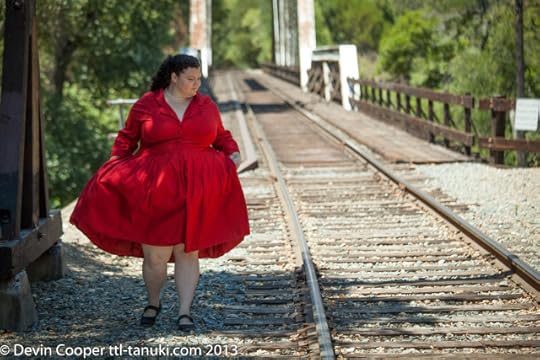
eShakti cotton poplin shirtdress in crimson. Pearls by Fred Meyer, mary jane flats by Doc Marten.
I was nineteen years old when realized I couldn’t shop for clothes at a normal store anymore. I was a 16/18 then, and I really just wanted a pair of pants. After four or five disastrous dressing rooms full of rejected pairs of pants, I realized it wasn’t going to happen. It was time to go to the other side.
On the other end of the mall were the outlands of clothes stores. Lane Bryant has been the most viable option for most women my size for two generations now. The other stores that opened to me were Torrid, Catherine’s, and a handful of others that nobody wants to name or try out. Better bloggers than I have taken on this problem, but here are the issues as I know them:
If you are fat
The clothes available to everyone else will not be available to you. It’s cute, it’s trendy, it’s in the front window, and it is IMPOSSIBLE for designers to make it in your size, because SCIENCE.
The clothes that are available in your size are ugly. They are shapeless, colorless, styleless, off-trend, asymmetrical, bizarrely patterned, or designed to create an optical illusion to lessen your overall mass.
These clothes will not be made of a natural fiber. They can only be made from ultra-stretchy unpronounceable material that has a shelf life of about six wears and washes before it falls apart.
These clothes that you don’t like, that don’t really fit, that don’t look good on you or feel good on you or even last very long will be expensive. 15-50% more expensive than they are for people just a little smaller than you. Happy birthday, fatty.
[image error]
eShakti retro style poplin dress in crimson. Boots by Ros Hommerson “Sonah” with wide calf. Accessories by Claire’s.
I’ve been struggling with this for most of my life, and I know I’m not the only one. Fat fashion bloggers all over the world are asking the same question: why don’t they want our money? Even if you think being fat is a morally indefensible disgusting and offensive way of life, you sure you don’t want our money? ‘Cause it’s a lot of money. We’re waving it at you, we want you to take it. So we go through the boycotts and the complaints and the Abercrombie & Fitch fake conspiracy and the miraculous sellout of the fatkini and we ask again: You want this money? You know you do. Cough up the cute clothes, in every size.
So one of the solutions that I’ve found has been a website called eShakti. This site sells really cute and classic dresses and blouses and skirts at a good price, with the very affordable option to customize to your measurements. I’m a hard fit. I’m outsize in every direction, but I do not favor a muumuu. I want a cute dress that actually fits me for less than $100. I’ve bought three from them so far, and they’re glorious.
Minor drawbacks: they run large in the bust, so I corrected my measurement down two inches. Fixed it right up. They’re made of cotton poplin, a fabric that no woman over a size 12 will have any familiarity with. It wrinkles, it doesn’t give, it feels very different. I’m loving it, but it was an adjustment.
Major benefits: Customizable length, sleeves, necklines, and details. Be as modest or as immodest as you like, show off or cover up. Color options on plus size that aren’t black or gray. POCKETS in skirts and dresses; that is a revelation. Good-quality garments that come with extra buttons and a measuring tape. Also, eShakti is coupon crazy. The prices are already very good, but I haven’t paid full price yet. There are always sales and offers and incentives to buy. I have a feeling my closet is going to fill up with these, and I have no regrets.
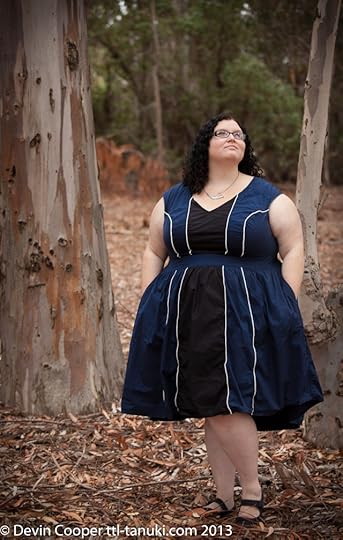
eShakti Make a Beeline dress. Glasses by Oscar de la Renta, necklace from Icing, flats by Doc Martens.
Regular retailers may never catch on. I may never cross back into a brick-and-mortar store that sells decent looking clothes for someone like me, but I think that day has ended anyway. The better options are online now, and the one I recommend most these days is eShakti.com.

This is us fat girls. Full body shot, not shrinking in shame. hungry for FASHION.
Note: I did not receive any promotional gifts or discounts for this blog post. I would absolutely not turn them down, however.
My straight dress size is a 22/24, but custom fits much better.
I live with a professional photographer, see his watermark on the pics for details. He’s amazing.
If you have any questions, ask away!



